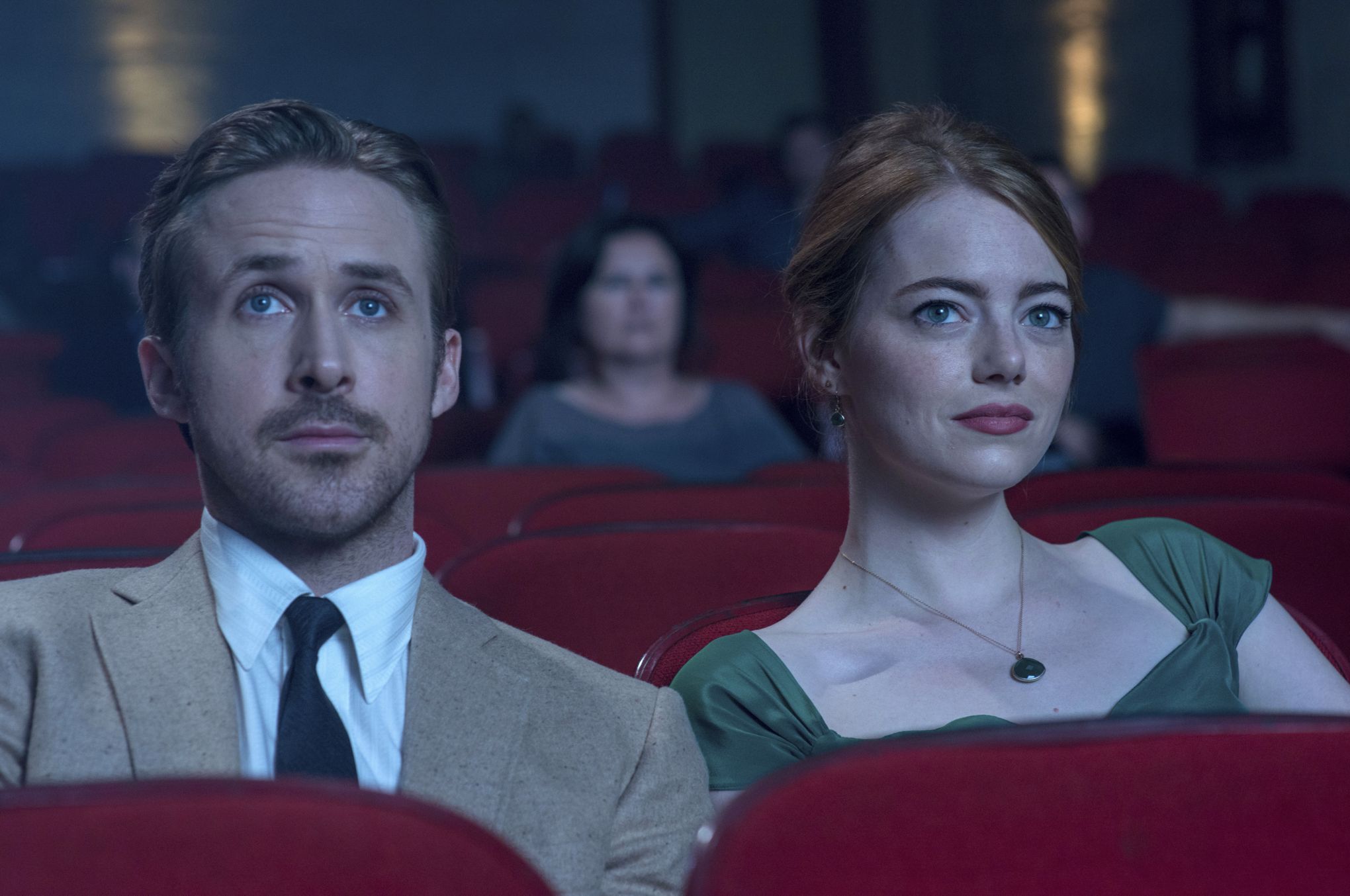A few weeks ago, for the first time in its exponentially rising awards season trajectory, the night belonged to La La Land. And at the Golden Globe Awards, where Damien Chazelle’s modern Hollywood musical swept with a record-breaking 7 wins, the m.o., as it is for all Oscar hopefuls, was to make sure it wasn’t the last time. I’ve heard the Globes and its attendant glamor and speeches described as an “Oscars audition” and that felt especially right this year. 15 million Americans, most of which hadn’t even had the chance to see La La Land yet, watched as scores of the perky, good-looking young Hollywood men who made the film (and Emma Stone) bounded up to the stage to pick up trophy after trophy. And with every win, it became more and more clear that the La La Land team had come prepared with a unified narrative to carry them through to Best Picture glory: “We can’t believe we got to make this film! And we can’t believe people actually liked it!”
It’s the disingenuous Taylor Swift surprise-face of the 2017 awards season. It’s also the only available move when you’ve created something that subverts nothing, that offends nobody: offer up a scenario that suggests that there was something you had to push against and overcame, despite the odds. Unlike all the polished, perfect films out there, an imagined someone didn’t believe in you. Who? Doesn’t matter. They’d have to be pretty bad, though, to not believe in a cutie like you.
The strategy paid off. (The Globes’ free advertising via its La La Land-themed opening musical number didn’t hurt.) Today the Academy Award nominations were announced and the film tied with Titanic and All About Eve’s record of 14 nominations. That’s a monumental victory for a film, as the creators tell it, was really teetering there for a second on the precipice of mainstream acceptance.
Like Swift, who has repeatedly found a way to position herself as a relatable, nonthreatening every-girl in contrast with more sexually expressive/less-white women and artists, La La Land has a foil. The sultry cheer captain that Lionsgate is clearly wary of being banished to the bleachers in favor of is the indie breakout Moonlight, which went from complete obscurity to a word-of-mouth sleeper hit over the last few months of 2016. At this stage in the game, Moonlight would appear to have a lot working in its favor, especially the symbolic significance of a subtle, empathetic, gay, black coming of age story being crowned by Hollywood in the first year of Donald J. Trump’s presidency. But with its mere eight Oscar nominations, it can no longer be credibly called a favorite for Best Picture. (Though it’s good to keep in mind that there’s not necessarily a correlation between the most-nominated film any given year and the winner of the top prize, especially not in recent years.)
Trying to pose as an underdog in comparison to Moonlight is a very bold move, especially when you’re a Technicolor musical about the agony and ecstasy of makin’ it in Hollywood, starring a proven pair of American–OK, North American–sweethearts. I remain unconvinced by La La Land itself and all that it stands for, but the way in which its woven its Oscar narrative at least gives us an opportunity to examine the privileges of promoting a movie like La La Land, particularly feigning bumbling ingenuity in hopes of — whoops! — tripping adorably into Oscar glory.
It’s very ’90s of Chazelle to suggest, as he did while accepting the award for Best Screenplay, that his pitch for La La Land was “utterly insane.” In that decade defined by lo-fi irony, it seemed like there was no place for non-animated movie musicals, with only Newsies and Evita making much of a lasting impression. It wasn’t until 2001 that Baz Luhrmann’s Moulin Rouge! made mainstream movie musicals palatable again, albeit by using existing and beloved pop songs for its anachronistic soundtrack–an approach which rates far higher on the “utterly insane” scale. From there, the all-singing all-dancing spectacular spectacular was back in circulation, with Chicago (2002), The Phantom of the Opera (2004), The Producers, Dreamgirls (2006) all getting big-screen adaptations. This hasn’t shown any sign of waning over the past decade (Les Miserables, Into The Woods, Annie). Regardless of box office performance or critical acclaim, movie musicals have regained their status as safe-bet crowdpleasers, a status that they had held onto comfortably from the dawn of sound until the rise of the counterculture.
It’s perhaps more useful to look at producer Fred Berger’s words while accepting the Globe for Best Motion Picture Musical: “I promise you, six years ago when we started working on this movie, the idea of making an original, L.A. set musical was an utter fantasy.” It’s true that there aren’t many L.A. set musicals; Los Angeles is traditionally more of a noir and crime and comedy town. But the originality of La La Land’s songbook seems like the more significant point Berger’s making — audiences were introduced to its songs as the story was unfolding, instead of being primed on them via cast recordings or their previous lives as pop singles. This has always worked fine for children’s animated movies, but adult audiences are more anxious and sometimes less willing to suspend their disbelief in unfamiliar musical territory.
That even the fussiest festival critics in Toronto instantly showered love on La La Land‘s music makes me think that there was never anything risky about an original musical to begin with. Because—and this is an objective fact—La La Land’s weakest point is its status as a musical. Its soundtrack has been a success, in a post-Hamilton world where it’s no longer unthinkable to listen to Broadway on your subway commute. But its breathy, limp vocals and instantly forgettable melodies are reminiscent of the time we all declared The Life Of Pablo a revolutionary masterpiece because we wanted it to be. On a technical level alone, the sound mix is bizarre. The big musical numbers are largely done in simulated single shots, ensuring that the camera always feels too far away from the actors’ faces. They telegraph the flashiness of an elaborate production (the gridlock traffic for “Another Day of Sun,” the fancy pool party of “Someone In The Crowd”) but it feels like watching the Macy’s Parade out of a 38th story window, a far-away pantomime of excitement that started before we arrived and will continue whether or not we’re along for the ride.
The embrace of La La Land, by critics and award-giving bodies alike, speaks more to a kind of desperation for a movie like La La Land than La La Land‘s own efficacy. (Viewed in less apocalyptic times, I suspect its escapist qualities would fade.) It may break with some movie musical traditions, it may be more melancholic than your typical stage-to-screen adaptation, but to suggest that its basic premise was any kind of risk for the people involved contradicts why people are responding so positively to it.
Compare this to Moonlight director Barry Jenkins, who spent years not only trying to get financing for Moonlight (whose budget was about a sixth of La La Land‘s) but trying to make another movie period. The irony is that while La La Land has been dubbed the escapist safe choice and Moonlight has gotten the label of a “serious” film, the latter is much more optimistic about the possibilities of love — that time-tested theme of musicals. Both films have their lushly romantic moments, but La La Land‘s dream fulfillment is ultimately entirely about professional aspirations; the film suspects you can’t be successful and in love at the same time. It will make a completely appropriate figurehead as the Best Picture of 2016, an exercise in nostalgia and career anxiety canny enough to add in a love story. I’m sorry, Damien, but I can totally believe you got to make that movie.





